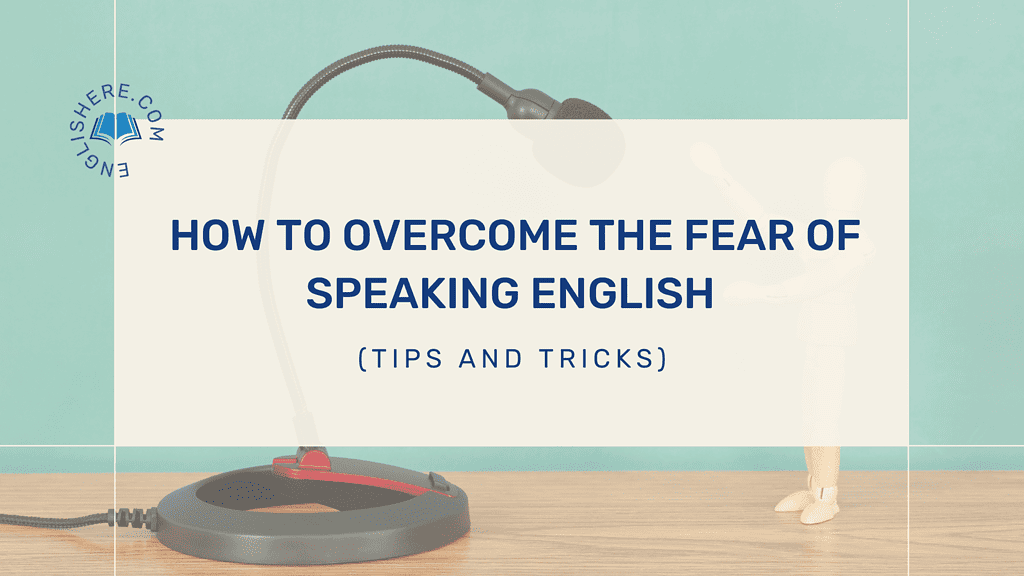Last Updated on June 1, 2023

Learning English is an exciting journey that opens up numerous opportunities for personal and professional growth. However, for many language learners, the fear of speaking English can be a significant obstacle on this path.
If you find yourself anxious or nervous when it comes to verbal communication in English, fear not!
In this article, we will explore effective strategies to overcome the fear of speaking English and gain confidence in your language skills.
Let’s embark on this empowering journey together!
Speaking English fluently is a common goal for language learners worldwide. The ability to express oneself with confidence and clarity in English can boost self-esteem, expand career prospects, and facilitate intercultural communication.

However, anxiety and fear can hinder progress and prevent learners from reaching their full potential.
By addressing these fears head-on and implementing targeted techniques, you can gradually overcome your apprehensions and become a more confident English speaker.
Understanding the Fear of Speaking English
Recognizing the Fear
The first step in overcoming the fear of speaking English is to recognize and acknowledge it.
Understand that feeling nervous or anxious about speaking is a normal part of the language learning process.
Recognizing your fear allows you to confront it and work towards overcoming it.
Common Causes of Fear
There are several common causes of the fear of speaking English.
It could be a fear of:
- making mistakes
- being judged by others
- not being understood
Previous negative experiences or lack of self-confidence can also contribute to the fear.
By identifying the specific causes, you can address them more effectively.
Impact of Fear on Language Learning
The fear of speaking English can have a significant impact on your language learning journey.
It may:
- prevent you from practicing speaking skills
- hinder your progress
- limit your opportunities for real-life conversations
Overcoming this fear is crucial to becoming a fluent and confident English speaker.
Strategies to Overcome the Fear of Speaking English
Set Realistic Goals
Start by setting realistic and achievable goals for your English speaking skills.
Break them down into smaller milestones to make them more manageable and trackable.
Celebrate each milestone you achieve, as it will boost your confidence and motivation.
Build Confidence through Preparation
Preparation plays a vital role in reducing anxiety.
Prepare for conversations or presentations in advance by:
- researching the topic
- practicing vocabulary and grammar
- anticipating possible questions or scenarios.
The more prepared you are, the more confident you’ll feel.
Practice Regularly
Consistent practice is key to overcoming the fear of speaking English. Set aside dedicated time each day to practice speaking.
You can start by speaking aloud to yourself or with a language learning partner.
Gradually increase the complexity of conversations and seek opportunities to engage with native English speakers.
Create a Supportive Learning Environment
Surround yourself with a supportive learning environment.
Find language exchange partners or join language communities where you can practice speaking without judgment.
Engaging with like-minded individuals will provide encouragement and support, making the learning process more enjoyable.
Seek Professional Help or Join Language Classes
If your fear of speaking English persists, consider seeking professional help or enrolling in language classes.
A qualified language teacher or tutor can:
- provide guidance
- personalized feedback
- create a safe space for you to practice and improve your speaking skills
Embrace Mistakes and Learn from Them
Remember that making mistakes is an essential part of the learning process.
Embrace your mistakes as opportunities for growth and learning.
Don’t be afraid of sounding imperfect or making errors. Each mistake is a stepping stone towards becoming a better English speaker.
Use Visualization and Positive Affirmations
Visualize yourself speaking English confidently and successfully.
- Use positive affirmations to reinforce your belief in your language learning abilities.
- Replace negative thoughts with positive ones, and visualize yourself overcoming challenges and achieving your language goals.
Utilize Technology and Online Resources
Take advantage of technology and online resources to enhance your English speaking skills.
There are numerous language learning apps, websites, and platforms that offer:
- interactive exercises
- pronunciation practice
- conversation simulations
Incorporate these tools into your learning routine to supplement your progress.
Engage in Conversations with Native Speakers
Actively seek opportunities to engage in conversations with native English speakers. This could be through:
- language exchange programs
- online language forums
- attending language-related events
Interacting with native speakers will help you gain confidence, improve your fluency, and adapt to different accents and speaking styles.
Overcoming Speaking Anxiety: Practical Tips and Techniques
Deep Breathing and Relaxation Exercises
Before engaging in a speaking activity, practice deep breathing and relaxation exercises to calm your nerves.
Deep breaths help reduce anxiety and increase oxygen flow to your brain, enhancing your focus and clarity during conversations.
Focus on Fluency rather than Perfection
Shift your focus from striving for perfection to achieving fluency.
Remember that effective communication is about expressing yourself and being understood, rather than speaking flawlessly.
Prioritize fluency over accuracy, and gradually work on improving both aspects.
Start with Low-Stress Conversations
Begin your speaking journey with low-stress conversations. Initiate small talks, such as ordering food or asking for directions.
These interactions provide a safe and non-threatening environment to practice your speaking skills without feeling overwhelmed.
Gradually Increase the Difficulty Level
As you gain more confidence, gradually increase the difficulty level of your conversations.
Challenge yourself by discussing more complex topics or participating in group discussions.
Pushing your boundaries will help you grow as a speaker and overcome any lingering fear.
Use Language Learning Apps and Platforms
Take advantage of language learning apps and platforms that offer speech recognition features and interactive speaking exercises.
These tools provide instant feedback, help you improve your pronunciation, and boost your speaking confidence.
Join Language Exchange Programs
Participate in language exchange programs where you can practice speaking English with native speakers who are also learning your native language.
These programs create a mutually beneficial environment for language practice and cultural exchange.
Participate in Speaking Clubs or Toastmasters
Consider joining speaking clubs or Toastmasters to further develop your speaking skills.
These platforms provide a supportive and constructive environment for:
- practicing public speaking
- receiving feedback
- building confidence in front of an audience
Record and Listen to Your Voice
Record yourself speaking English and listen to the recordings.
Pay attention to areas where you can improve, such as pronunciation or intonation.
Self-assessment through recordings can help you identify strengths and weaknesses and track your progress over time.
Tracking Progress and Celebrating Achievements
Set Speaking Goals and Track Progress
Set specific speaking goals and track your progress regularly. This could include the number of conversations you engage in, the duration of each conversation, or the fluency level you aim to achieve.
Monitoring your progress will give you a sense of accomplishment and motivate you to continue improving.
Celebrate Small Wins
Acknowledge and celebrate even the smallest achievements in your language learning journey. Whether it’s successfully ordering food in English or engaging in a longer conversation, every milestone counts.
Celebrating these wins boosts your confidence and reinforces positive experiences with speaking English.
Reflect on Positive Experiences
Take time to reflect on positive experiences you’ve had while speaking English.
Recall instances where you felt confident and effective in communication.
Reminding yourself of these positive experiences can help counteract any lingering fear or anxiety.
FAQs
Is it normal to feel nervous when speaking English?
Yes, feeling nervous when speaking a new language is normal. Many language learners experience this. The key is to recognize the fear and work on strategies to overcome it.
Can I overcome the fear of speaking English on my own?
Yes, you can overcome the fear of speaking English on your own with dedication and perseverance. However, seeking professional help or joining language classes can provide additional guidance and support.
How long does it take to overcome the fear of speaking English?
The time it takes to overcome the fear of speaking English varies for each individual. It depends on factors such as the intensity of the fear, your commitment to practicing, and the strategies you employ. Be patient and celebrate small wins along the way.
What if I make mistakes while speaking English?
Making mistakes is a natural part of the language learning process. Embrace them as opportunities for growth and learning. Native speakers are often understanding and appreciate the effort to communicate in their language.
Can technology help in overcoming the fear of speaking English?
Yes, technology can be a valuable tool in overcoming the fear of speaking English. Language learning apps, online resources, and speech recognition features can provide practice opportunities, feedback, and boost your confidence.
Conclusion
Overcoming the fear of speaking English is an essential step towards becoming a confident language learner. By implementing strategies such as setting realistic goals, practicing regularly, and creating a supportive learning environment, you can gradually overcome your fear and develop fluency and confidence in speaking English.
Remember, learning a language is a journey, and it’s okay to face challenges along the way. Embrace the process, be patient with yourself, and celebrate your progress. With perseverance and a positive mindset, you can conquer your fear and unlock your full potential as an English speaker.
Interested in igniting your creativity? Dive into the world of my literary works and experience the power of imagination.
Don’t miss out on the opportunity to boost your English language skills – check out our other posts!
- 5 Online Learning Fears Holding Back ESL Students (And How to Overcome Them)
- 15 Easy English Learning Hacks for Busy People
- How to Improve Your English Pronunciation (5 Simple and Effective Ways)
- 29 Essential English Phrases for Traveling Abroad (and Connecting with People)
- How to Overcome the Fear of Speaking English (Tips and Tricks)


